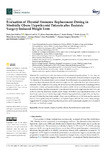| dc.contributor.author | Juiz-Valiña, Paula | |
| dc.contributor.author | Cordido, María | |
| dc.contributor.author | Outeiriño-Blanco, Elena | |
| dc.contributor.author | Pértega-Díaz, Sonia | |
| dc.contributor.author | Urones Cuesta, Paula | |
| dc.contributor.author | García-Brao, María Jesús | |
| dc.contributor.author | Mena, Enrique | |
| dc.contributor.author | Pena-Bello, Lara | |
| dc.contributor.author | Sangiao-Alvarellos, Susana | |
| dc.contributor.author | Cordido, Fernando | |
| dc.date.accessioned | 2021-09-01T09:38:52Z | |
| dc.date.available | 2021-09-01T09:38:52Z | |
| dc.date.issued | 2021-08-19 | |
| dc.identifier.citation | Juiz-Valiña P, Cordido M, Outeiriño-Blanco E, Pértega S, Urones P, García-Brao MJ, Mena E, Pena-Bello L, Sangiao-Alvarellos S, Cordido F. Evaluation of thyroid hormone replacement dosing in morbidly obese hypothyroid patients after bariatric surgery-induced weight loss. J Clin Med. 2021 Aug 19;10(16):3685. | es_ES |
| dc.identifier.issn | 2077-0383 | |
| dc.identifier.uri | http://hdl.handle.net/2183/28410 | |
| dc.description.abstract | [Abstract] The most frequent endocrine disease in obese patients is hypothyroidism. To date, there are no clear data regarding what happens to the dose of levothyroxine (LT4) after bariatric surgery (BS). The objective of the present study was to evaluate thyroid hormone replacement dose in morbidly obese hypothyroid patients after BS-induced weight loss. We explore the best type of measured or estimated body weight for LT4 dosing. We performed an observational study evaluating patients with morbid obesity and hypothyroidism who underwent BS. We included 48 patients (three men). In morbidly obese hypothyroid patients 12 months after BS-induced weight loss, the total LT4 dose or the LT4 dose/kg ideal body weight did not change, while there was a significant increase in LT4 dose/body surface area, LT4 dose/kg weight, LT4 dose/kg adjusted body weight, LT4 dose/kg body fat, and LT4 dose/kg lean body weight. There were no differences in LT4 dose and its variation between sleeve gastrectomy (SG) and Roux-en-Y gastric bypass (RYGB). The present study strongly suggests that LT4 dosing in obese hypothyroid patients can be individually adapted more precisely if it is based on ideal body weight. | es_ES |
| dc.description.sponsorship | The results of this work have been funded by the Project Nº PI16/00884 to F.C. and S.S-A.; integrated in the National Plan for Scientific Research, Development and Technological Innovation 2013–2016, Spain and funded by the ISCIII (Instituto de Salud Carlos III)-General Subdirection of Assessment and Promotion of the Research–European Regional Development Fund (FEDER) “A way of making Europe” | es_ES |
| dc.language.iso | eng | es_ES |
| dc.publisher | MDPI | es_ES |
| dc.relation | info:eu-repo/grantAgreement/MINECO/Plan Estatal de Investigación Científica y Técnica y de Innovación 2013-2016/PI16%2F00884/ES/RELACION ENTRE MARCADORES HORMONALES DE CONTROL DE LA INGESTA Y GASTO METABÓLICO. EFECTO DEL BALANCE ENERGÉTICO NEGATIVO Y LA MODIFICACIÓN DE GH | |
| dc.relation.uri | https://doi.org/10.3390/jcm10163685 | es_ES |
| dc.rights | Creative Commons Attribution 4.0 International License (CC-BY 4.0) | es_ES |
| dc.rights.uri | https://creativecommons.org/licenses/by/4.0/ | * |
| dc.subject | Obesity | es_ES |
| dc.subject | Bariatric surgery | es_ES |
| dc.subject | Hypothyroidism | es_ES |
| dc.subject | Thyroid hormone replacement | es_ES |
| dc.title | Evaluation of thyroid hormone replacement dosing in morbidly obese hypothyroid patients after bariatric surgery-induced weight loss | es_ES |
| dc.type | info:eu-repo/semantics/article | es_ES |
| dc.rights.access | info:eu-repo/semantics/openAccess | es_ES |
| UDC.journalTitle | Journal of Clinical Medicine | es_ES |
| UDC.volume | 10 | es_ES |
| UDC.issue | 16 | es_ES |
| UDC.startPage | 3685 | es_ES |
| dc.identifier.doi | 10.3390/jcm10163685 | |






